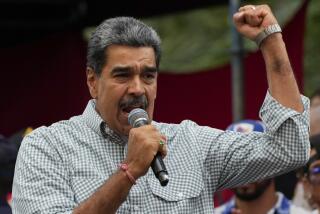U.S. Envoy, 7 Others Ousted by Nicaragua
- Share via
MANAGUA, Nicaragua — The Sandinista government Monday ordered U.S. Ambassador Richard Melton and seven other embassy officials to leave the country within 72 hours, accusing them of state terrorism.
The leftist regime also ordered the opposition newspaper La Prensa closed for 15 days, shut down the Roman Catholic radio station and arrested an opposition leader.
The actions came a day after police clashed with thousands of demonstrators at an anti-Sandinista rally.
President Daniel Ortega on Sunday described the demonstration as part of a U.S. plan to undermine his government, and he vowed to “act with force” against any violations of public order.
Foreign Minister Miguel D’Escoto, who announced the decision to expel the embassy officials, said the Americans were engaging in “activities complementary to the state terrorism the Administration of U.S. President Ronald Reagan is carrying out against Nicaragua.”
D’Escoto said he called Melton to his office Monday afternoon to inform him of the decision and gave him a sealed letter also advising U.S. Secretary of State George P. Shultz of the action.
Shultz, on a Far East trip, said in Manila that the expulsion of the eight American diplomats is “an absolute outrage.”
Speaking with reporters at a Foreign Ministry news conference, D’Escoto described Melton as “a robot of the maniacal Abrams,” a reference to Elliott Abrams, assistant secretary of state for inter-American affairs.
D’Escoto said U.S. Embassy officials were at Sunday’s opposition demonstration in Nandaime, about 40 miles south of Managua.
Melton, he said, came “in his mind to fill a leadership vacuum in this country, and he became confused.”
The government earlier accused Melton of carrying out a destabilization plan against Nicaragua.
Melton, 52, presented his ambassadorial credentials to the Nicaraguan government in May. When he arrived in Nicaragua on April 12, he said it was a “decisive moment in U.S.-Nicaraguan relations.”
Replacement for Bergold
Melton filled the post left vacant since July, 1987, when Ambassador Harry Bergold returned to Washington.
In closing Radio Catolica, the Interior Ministry accused the station of “inciting to violence, disorder and lack of respect for constitutional government.”
Msgr. Bismarck Carballo, the station’s director, called the order “unjust and arbitrary.”
An official in the Interior Ministry press office, speaking on condition of anonymity, said police arrested Secretary General Miriam Arguello of the Conservative Party for “being the principal instigator of yesterday’s events in Nandaime.”
The government closed down Radio Catolica in January, 1986, but allowed it to reopen last October under a Central American peace agreement that Ortega and four other Central American presidents signed in August, 1987.
Pedro Joaquin Chamorro, one of the five directors of the U.S.-backed Contras, said in Miami on Monday: “The Sandinistas are demonstrating once again that they are not prepared for democracy.”
Chamorro said the Contras have been negotiating in good faith with the Sandinistas but that continued repression inside Nicaragua would leave them little choice but to return to armed struggle.
In breaking up Sunday’s unauthorized anti-government protest, police arrested 42 people, including Carballo’s brother, an Interior Department statement said Monday. According to a police statement, the violence began when protesters threw rocks at police, who responded with tear gas.
Witnesses said police started the fracas by pushing and shoving people at the back of the crowd, who had gathered on a field to listen to speeches. They said the crowd hurled stones in response to the gas.
The ministry said 10 police officers were hurt. Witnesses, who spoke on condition of anonymity, said they saw police officers using their fists, feet and rifle butts to beat scores of civilians.
More to Read
Sign up for Essential California
The most important California stories and recommendations in your inbox every morning.
You may occasionally receive promotional content from the Los Angeles Times.










